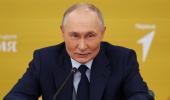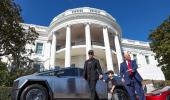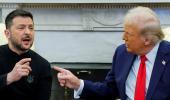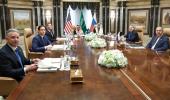Putin is keen on establishing a good personal rapport with Trump and anchor a meaningful US-Russia partnership, realistic enough to accept that Trump is as good an American president as Russia would ever get, observes Ambassador M K Bhadrakumar.

The Kremlin apparently came to the conclusion last week that it was about time to do some plain-speaking that US President Donald Trump's quest for a 30-day ceasefire in the Ukraine war was a non-starter.
Over the weekend, in a series of remarks, Trump reacted sharply that he's 'very angry' with President Vladimir Putin over his approach to the proposed ceasefire and threatened to levy tariffs on Moscow's oil exports if the Russian leader does not agree to a truce within a month.
Trump is either incapable or unwilling to accept that neither the Russians nor the Ukrainians have their heart in the ceasefire deal (for different reasons, though) even while paying lip service to it, as each wants to have Trump on its side.
Unlike the Ukrainians who are blase about their desire to continue to wage the war until Russian forces vacate their territories in the east (knowing that may never happen), Russians are savvy operators who prioritise the unfinished business of the war while playing their part in the diplomatic circuit.
Actually, Russians are in two minds whether the war could end once their military gains total control over Donbass, or, should they also take control of Odessa, Nikolaev, Dnipropetrovsk, Kharkov, etc. to create a security zone roughly, along the Dniepr river, and, let the UN figure out the future of the rump State of Ukraine.
Such is the backlog of the West's betrayals and repudiation of agreements, including during Trump's first term, that Russia may come to estimate that its best security guarantee for durable peace lies in creating solid, immutable facts on the ground.

Trump will do well to read the extraordinary report featured in the New York Times dated March 29, 2025 titled The Partnership: The Secret History of the War in Ukraine. It is a doctored version of the untold story of America's hidden role in Ukrainian military operations against Russia but the main thing is that it confirms the Russian allegation that this has been a proxy war kick-started by the US with great deliberateness.
Suffice to say, Trump's claim to be a good Samaritan with a bleeding heart who wants the war to end, et al, won't fly.
On the other hand, Putin is nonetheless keen on establishing a good personal rapport with Trump and anchor a meaningful US-Russia partnership on it, realistic enough to accept that Trump is as good an American president as Russia would ever get.
That said, Putin is also unwavering that in order for peace to be durable, conditions must be created first where he needs Trump's understanding, although Russian people are deeply sceptical about any US mediation.
Trump refused to say if there was any deadline for Russia to agree to a ceasefire in Ukraine, but he told reporters on board Air Force One, 'It's a psychological deadline. If I think they're [Russians] tapping us along, I will not be happy about it.'
On the contrary, the Russians have been as transparent as they could in the prevailing climate of deep distrust -- and no real effort has yet begun to address the root causes of the conflict.

The Russian negotiator Grigory Karasin, an accomplished career diplomat and deputy foreign minister and currently a senator heading the foreign affairs committee of the Upper House Federation Council, who was the negotiator at the expert group negotiations at Riyadh last Monday, said over the weekend with great candour on Russia's national television that the 12-hour talks 'haven't led to any radical breakthrough yet, but the opportunities are there. It would have been naive to expect any breakthroughs.'
Karasin claimed that the US negotiators, including senior National Security Council director Andrew Peek and State Department policy planning chief Michael Anton, initially presented 'proposals that are unacceptable to Russia.'
'But then, in my opinion... they realised that a team of civilised, reasoned interlocutors was sitting in front of them,' he said, describing the talks as having had a 'good atmosphere' despite the lack of progress.
Importantly, Karasin said he expects US-Russian negotiations on Ukraine to continue at least until the end of 2025 or beyond.
We will never know how accurate was the feedback Trump received from the inconclusive negotiations in Riyadh.
Clearly, the US has since resiled from the understanding given to the Russian side in regard of waiving the sanctions for the export of Russian food and fertilisers to the world market, facilitate the payments system and provide other underpinnings needed.
Karasin's glasnost was apparently not music to Trump's ears. Nonetheless, good sense prevailed finally, as Trump signalled his intentions to talk to Putin.
Will that help? Putin said as recently as last week that Russia's interests will not be bartered away.
Even if Trump were to now decide to join hands with the UK and France to lead the 'coalition of the willing' to continue the Ukraine war, it is unlikely Putin will budge on Russia's core interests.

However, Trump's real predicament is something else. He had a choice to decouple the US from the war.
But then, he was also swayed by Wall Street's obsessive interest in Ukraine being a honeypot, which of course is incompatible with his known aversion to assuming the obligations and responsibilities of a de facto colonial power in a faraway land 10,000 kms away.
The result is, Ukrainians have lost respect for him. Zelenskyy hit out on Friday, saying, 'Ukraine has received the new draft agreement from the US, which is totally different from the previous framework agreement on natural resources. Ukraine will not recognise the United States military aid as a debt. We are grateful for support but it's not a loan.'
The Wall Street Journal reported Saturday on the new revised draft document sent to Kyiv from Washington, which insists on Zelenskky signing an agreement giving the American companies control over key economic projects.
In particular, the US seeks the right to be the first to participate in Ukraine's infrastructure projects and mining programs, including rare-earth metals and construction of ports.
The fund, managed primarily by US representatives, will channel the profits to pay off the cost of military aid provided by Washington to Kiev.
If the agreement is signed, Ukraine will have 45 days to submit a list of projects for consideration by the fund.

Britain's Daily Telegraph reported that under the latest version of the deal, the US would control half of Ukraine's oil and gas reserves, its metals and much of its infrastructure, including railways, ports, pipelines and refineries, through a joint investment fund.
The US plans to receive all profits until Ukraine pays it at least $100 billion in compensation for military aid, with a 4% surcharge. Kyiv will start receiving 50% of the profits only after the debt is repaid.
The newspaper added that the new fund will be registered in the state of Delaware but will operate under the jurisdiction of New York.
And the US will have the right to veto the sale of Ukrainian resources to third countries and the prerogative to check the accounts of any Ukrainian agency involved.
Trump has fallen between two stools. Ukraine is highly unlikely to accept the deal with the US. Also, trust Russian ingenuity to make a counter offer of a business relationship to Trump that he can't refuse.
In sum, Trump's attempt to enhance trust with Putin was indeed the right approach. And Putin had reciprocated in earnestness.
Indeed, their parley made some headway until it came under weather, thanks to the mercantile considerations regarding Ukraine's resources, which require that the war must be put to sudden death. Whereas, such wars have their own dynamics too.
Ambassador M K Bhadrakumar served the Indian Foreign Service for 29 years.
Feature Presentation: Aslam Hunani/Rediff.com











 © 2025
© 2025